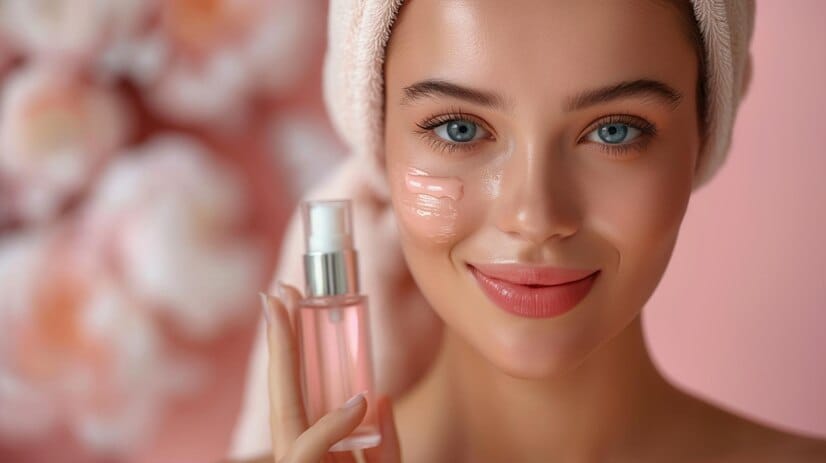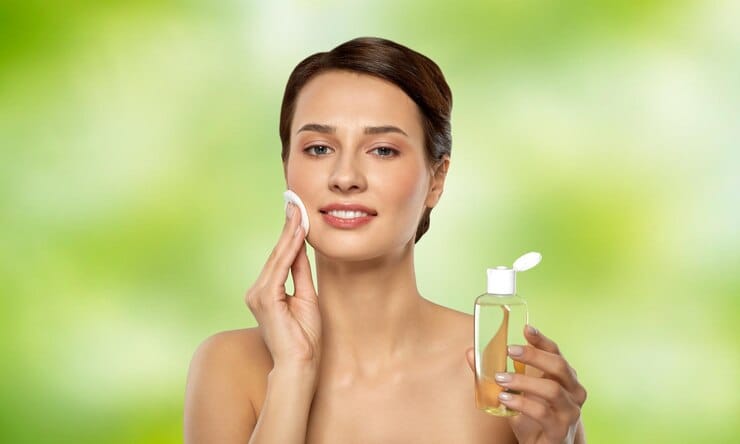Choosing the right cleanser can be a game-changer in your skincare routine. The debate between micellar water and traditional cleansers has been ongoing, with each offering distinct benefits and drawbacks. This article will explore both options to help you decide which is best suited for your skin type.
What is micellar water?

Micellar water is a skincare product made up of purified water, hydrating ingredients like glycerin, and low concentrations of mild surfactants. The surfactants group together to form micelles, tiny balls of cleansing molecules. These micelles act like magnets, attracting dirt, oil, and makeup from the skin without stripping away natural oils or disrupting the skin’s barrier.
What Are Traditional Cleansers?
Traditional cleansers are typically formulated with a combination of water, surfactants, oils, and other active ingredients designed to deeply cleanse the skin. They come in various forms, such as foaming cleansers, gel cleansers, cream cleansers, and oil-based cleansers, each targeting specific skin concerns and preferences.
How Micellar Water Cleanses the Skin

Micellar water cleanses the skin by using micelles to trap and lift away dirt, oil, and makeup. The micelles bind to impurities, allowing them to be wiped away easily with a cotton pad. Because it doesn’t require rinsing, micellar water is a convenient option for quick cleansing or for those who prefer a minimalistic skincare routine.
How Traditional Cleansers Work
Traditional cleansers work by emulsifying dirt, oil, and makeup on the skin’s surface, allowing them to be rinsed away with water. The surfactants in these cleansers break down oils and impurities, providing a thorough cleanse. Some traditional cleansers also contain active ingredients like salicylic acid, glycolic acid, or hydrating agents to target specific skin concerns.
Benefits of Micellar Water

- Gentle Cleansing: Micellar water is gentle on the skin, making it suitable for daily use and for people with sensitive skin.
- No Need to Rinse: Unlike traditional cleansers, micellar water doesn’t require rinsing, making it a convenient option for on-the-go cleansing.
- Hydrating: Micellar water often contains hydrating ingredients like glycerin, which can help maintain the skin’s moisture balance.
- Versatile: It can be used to remove makeup, cleanse the skin, and refresh the complexion without multiple products.
Drawbacks of Micellar Water
- May Not Remove Heavy Makeup: While effective for light makeup, micellar water may not fully remove waterproof or heavy makeup.
- Not a Deep Cleanser: It may not provide the deep cleansing that traditional cleansers offer, particularly for those with oily or acne-prone skin.
- Residue: Some formulations can leave a residue on the skin, which may be bothersome for some users.
Benefits of Traditional Cleansers

- Deep Cleansing: Traditional cleansers can provide a deeper cleanse, effectively removing oil, dirt, and makeup.
- Variety of Formulations: With options ranging from foaming to creamy, there is a cleanser for every skin type and concern.
- Targeted Ingredients: Many traditional cleansers contain active ingredients that address specific skin concerns, such as acne, dryness, or aging.
- Thorough Makeup Removal: Traditional cleansers, especially oil-based ones, are typically better at removing heavy or waterproof makeup.
Drawbacks of Traditional Cleansers
- Can Be Harsh: Some traditional cleansers can strip the skin of its natural oils, leading to dryness or irritation.
- Requires Water: Traditional cleansers need to be rinsed off, which can be less convenient compared to micellar water.
- Over-cleansing: Using a strong cleanser too frequently can disrupt the skin’s natural barrier and lead to issues like dryness or sensitivity.
Micellar water vs. traditional cleaners for sensitive skin

For sensitive skin, micellar water is often a better choice because of its gentle, non-irritating formula. Traditional cleansers, especially those with strong surfactants or fragrances, can sometimes cause irritation or redness. However, there are also gentle traditional cleansers formulated specifically for sensitive skin that can be effective.
Micellar Water vs. Traditional Cleansers for Oily Skin
Oily skin can benefit from the deep cleansing properties of traditional cleansers, especially those containing salicylic acid or benzoyl peroxide, which help control excess oil and prevent acne. Micellar water can be used as a second step in cleansing or for a quick refresh, but it might not be enough on its own to control oil production.
Micellar Water vs. Traditional Cleansers for Dry Skin

For dry skin, micellar water can be a good option because it cleanses without stripping the skin of its natural oils. Traditional cleansers can also work for dry skin, especially cream-based or hydrating formulations that cleanse while adding moisture. It’s important to avoid foaming cleansers that can be too drying for this skin type.
Micellar Water vs. Traditional Cleansers for Combination Skin
Combination skin can benefit from using both micellar water and traditional cleansers. Micellar water can be used in the morning or for a light cleanse, while a traditional cleanser can be used in the evening to remove makeup and thoroughly cleanse the skin. Gel or foam cleansers can help control oil in the T-zone, while creamier cleansers can hydrate dry areas.
Which Cleanser is Best for Your Skin?

The best cleanser for your skin depends on your specific needs and skin type. For a gentle, quick cleanse, micellar water is ideal. For a deeper clean or to address specific skin concerns like acne or oiliness, a traditional cleanser may be more suitable. Many people find that incorporating both types of cleansers into their routine works best, using micellar water for a quick cleanse and a traditional cleanser for more thorough cleansing.
Conclusion
Both micellar water and traditional cleansers have their place in a well-rounded skincare routine. By understanding their benefits and drawbacks, you can choose the best cleanser for your skin type and concerns. Whether you prefer the convenience of micellar water or the deep cleaning power of traditional cleansers, the key is to find what works best for your unique skin needs.
FAQs
- Can I use micellar water every day?
- Yes, micellar water is gentle enough for daily use on most skin types. However, if you have very sensitive skin, you may want to do a patch test first.
- Are traditional cleansers better for acne-prone skin?
- Traditional cleansers with active ingredients like salicylic acid can be more effective for acne-prone skin as they help to reduce oil and prevent breakouts.
- Can micellar water replace a face wash?
- Micellar water can be used as a substitute for face wash, especially for those with sensitive skin or for quick cleansing. However, it may not provide a deep clean like some traditional face washes.
- Do I need to rinse off micellar water?
- While micellar water is a no-rinse formula, some people prefer to rinse it off to avoid any residue on their skin.
- Which is more eco-friendly: micellar water or traditional cleansers?
- The eco-friendliness of a product depends on its ingredients, packaging, and the production process. Generally, traditional cleansers with minimal packaging and natural ingredients may be more sustainable.







